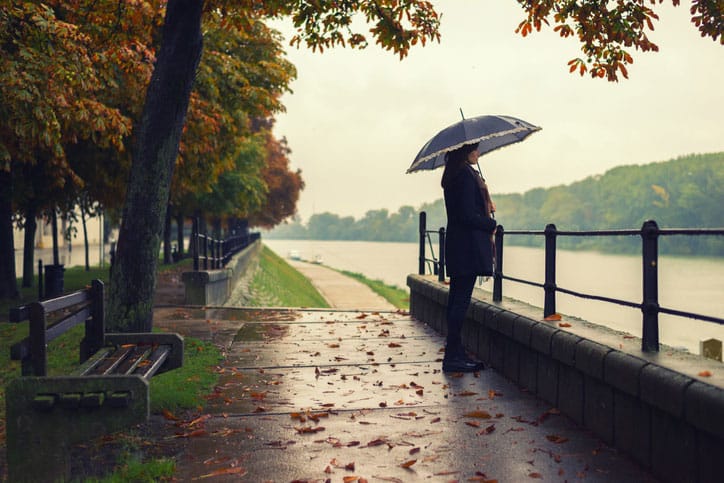Some people love the shift from summer to fall. The crisp breeze in the air ignites their fondest memories.
For others, the fall is a dreaded time of year. This is when their depression peaks and they struggle to get through each passing day.
If you’re in the latter category, know you’re not alone. This guide explains why you may feel sad in the fall, along with coping strategies to help you push through the sadness.
Sad vs. SAD (Seasonal Affective Disorder)
It’s important to distinguish between feeling sad and feeling SAD. SAD stands for seasonal affective disorder. It affects approximately 3% of the general population, but it’s more prevalent for those with underlying conditions. Roughly 20% of people with major depressive disorder and 25% of those with bipolar disorder experience SAD in the fall. (Source)
Seasonal affective disorder tends to occur every year. If your depression recurs around the same time every year, you might have SAD.
If this year’s sadness feels like a fluke, there may be other factors at play. Stress from a job change, missing a lost loved one, feeling lonely after a breakup – tons of circumstances could make you feel sad near the holidays. CNLD Testing & Therapy offers mental health tips and positive support to guide you through this journey.
Why You May Get Sadder in the Fall
There are several reasons why people tend to feel sadder in the fall. Here’s an overview of the most common culprits:
- Time and financial stress around the holidays. The kids are out of school, work is piling up, money is tight from gifts/food, and you’re just trying to survive it all. Depression is a byproduct of intense stress, so you may feel it more prevalently at the end of the year.
- There is less sunlight during the day in the fall and winter months. Sunlight encourages the release of serotonin, a chemical in your brain that makes you feel happy. Less sunlight yields less serotonin production.
- The holidays make you feel lonely. This is particularly common for single adults or people isolated from their loved ones during the holidays.
- Grief increases around the holidays. You reflect on family members and friends you no longer get to see on the holidays, which may spark a depressive spiral.
- You’ve cut ties with people you used to see in the fall and winter months. If you’ve recently gone “no contact” with a family member or friend, not seeing them over the holidays may create extra pain.
- Struggles with sobriety. Depression makes it harder to fight addictive urges, and the addiction makes the depression worse. This is a vicious cycle that highlights the importance of having a strong support system for addiction recovery.
- Cold weather limits productivity. You’re less likely to go jogging, run errands, or stay motivated at work when it’s cold outside. This may spark feelings of “not being enough,” even if you’re doing the best you can.
The list above is not comprehensive. Every person’s story and struggles are unique to them. Determine what’s causing your fall sadness so that you can find effective coping strategies.
How to Get through Seasonal Depression
If you have an ongoing relationship with a therapist or counselor, utilize that resource in the fall. You may need to increase the frequency of your therapy appointments to cope with heightened depression symptoms. Work with your therapist to find the route of your depression, and try different coping techniques to address it. Do not get discouraged. The journey may feel like a rollercoaster, but it will pay off in the end.
Spend as much time in sunlight as possible. You may have to soak up the sun through a window, but the UV rays will help. Open your blinds, or take a drive to a beautiful view. Bask in the natural remedy Mother Nature provides.
Limit your stress as much as possible during busy weeks. If hosting a holiday meal is too much to handle, ask someone else to carry that burden. Have a non-traditional Christmas feast of junk food and tell everyone to wear pajamas. Instead of worrying to death about making things perfect, embrace the imperfection that lies ahead.
Journal your feelings as they arise. Get the thoughts out of your head and on paper. Talk to trusted friends about your seasonal depression. They may have the same feelings. Lean on each other in this time of need, and look forward to the warm months to come.
CNLD Testing & Therapy offers confidential counseling for individuals and families. We provide teletherapy appointments, so you can see your therapist while you travel. Reach out to (734) 994-9466 to schedule a judgment-free therapy session.


